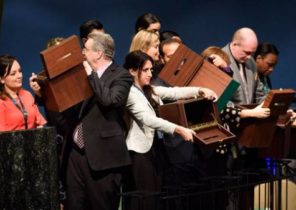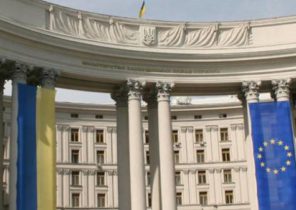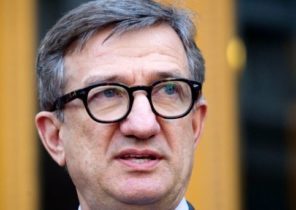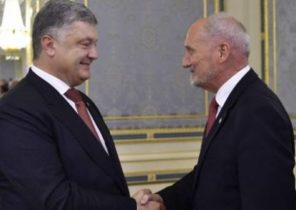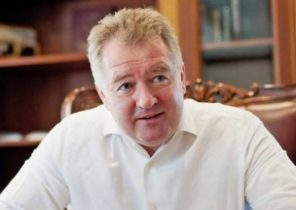
After the Ukrainian crisis, the Baltic sea and the Baltic States have become an important part of a big political game between NATO and Russia. “The relationship between the West and Russia make it worse, but I don’t think it will lead to military conflict”, — said a senior researcher at Splidsboel Flemming (Flemming Splidsboel).
At the border between Lithuania and Poland wedged part of the territory of Russia. Kaliningrad, an enclave with an area of 223 square kilometers, was geographically separated from the rest of Russia when Lithuania in 1991 became an independent state and in 2008 became a member of the European Union increased, due to this, in an easterly direction.
But the location of the enclave in mid-European territory, NATO has, from the Russian point of view, its advantages, and Kaliningrad is currently playing a Central role in the political game taking place in the Baltic States and the Baltic sea.
Not least because Russia has placed in the enclave of anti-aircraft missiles with a range of 250 kilometers, which can hit ground targets.
These weapons systems in the event of a conflict between NATO and Russia can close air space over a large European area and to limit the possibility of NATO warships to come to the Baltic States to help.
Besides, Russia in 2017 will deploy in the Kaliningrad region mobile tactical Iskander missiles, which can carry nuclear warheads and is preparing to equip the army in the Western areas of Russia adjacent to Ukraine and the Baltic States highly mobile armored units.
For the same reason the army intelligence service, in its just-published assessment of the risk situation in the world with a Danish point of view, concludes that “the Baltic sea region was a big area of friction between Russia and NATO.”
Russian first strike strategy
Army intelligence service said in an interview with Berlingske that he believes the military preparations of Russia and the modernization of its army in the Western part of the country and the Kaliningrad region means that Russia will try to create a “first strike capability” in the region with conventional weapons. This strategy, which is to create military forces, for example, invasion of the small Baltic country. True, not necessarily what is going to happen.
Risk assessment military intelligence military describes as “military signal sent to the NATO Alliance and the United States, that Russia is ready to respond to threats that, according to Russia come from the military preparations of NATO in the Baltic sea region and Eastern Europe.”
Intelligence believes, however, that “Russia is unlikely to carry out a military attack on the three Baltic countries”, not least because of the musketeer oath of NATO (“one for all and all for one” — approx.transl.), according to which an attack on one NATO country is an attack on the entire Alliance.
Nevertheless, the military activity of Russian concern of the Danish military intelligence.
“Distrust of Russia to NATO and Russia’s willingness to take risks increases the risk of misunderstanding and miscalculation. And Russia in the coming year will continue to be a political challenge to the West and Denmark,” — said the head of military intelligence, Findsen Lars (Lars Findsen) in an interview with Berlingske.
Risk assessment of exploration characterized in recent years Russia as a great political challenge for Denmark. Lars, Findsen says:
“The attitude of Russia to the West and Vice versa has not become any better in 2016. Position in global foreign policy and security has also become difficult. Denmark it is difficult to act in this world.”
According to the rating of the Riga military intelligence, the military preparations of the Russian and especially the deployment of missiles in Kaliningrad region is a “strategic blowback” placing combat battalions of various NATO countries in the Baltics and in the modernization of NATO’s missile defence in Poland and Romania.
This view is shared by Splidsboel Flemming Hansen, senior researcher, Danish Institute of international studies studying international security issues. But he is “not concerned”.
“Military intelligence gives the impression of a troubled, and maybe she has other reasons that are unknown to me, but much of what happens at regional and local level, is what is happening on a larger scale. And if I get a rocket “Iskander” from the Kaliningrad region or some other place, for me it is absolutely indifferent,” says Flemming Splidsboel and stresses that Russia has at its disposal a lot of things where you can launch rockets, such as high-tech Russian submarine in a submerged position.
Russian advantages in a short period of time
Flemming Splidsboel also stresses that Russia now has a military advantage in the Baltic region for a short period of time. One study of the various Baltic military scenarios, published by the Rand Corporation in September 2016, in particular, showed that the Russian army is at most 60 hours to reach the Baltic capitals of Tallinn and Riga.
“But I doubt whether Russia has any such intentions. In certain circles it is considered an outrage. I also believe that Putin is at heart gladly would restore the Soviet Union. But I also think he realizes that this is unrealistic,” says Flemming Splidsboel.
Therefore, senior researcher, “not particularly worried,” but, nevertheless, believes that Russia’s actions require a response to NATO.
“In fact, I think that we should arm to signal to Russian voters that the policies pursued by their politicians has consequences for them. When Russia simulates an attack on Stockholm and Bornholm, we have to say that we don’t want to do this anymore, but if you want to do this race, that’s your business. But we’ll smash you like we smash you before,” says Flemming Splidsboel and emphasizes that this approach is consistent with the concept of Russia that the West wants the deterioration of Russia.
“This is very bad, but I don’t see any other way out. If we are not doing anything, we will always face new provocations, in particular, because the leadership lives due to this political confrontation. I also believe that the relationship between the West and Russia deteriorate, but I don’t think that it would end military conflict,” says Flemming Splidsboel.
The same can be said the Deputy head of the center for Christian Christensen Sæby (Kristian Søby Kristensen) Centre for military studies University of Copenhagen.
“This does not mean that we will not be concerned about this, but there is no reason for immediate panic,” — says Christian Saeby Christensen, who study the security policy. At the same time, it recalls that the situation in the world looks completely different from the Russian point of view.
“There is no doubt that the idea of an aggressive US and NATO lives in the Russian society,” — said the Deputy head of the center and uses the example of the Russian annexation of Crimea: “the Fact that from our point of view is considered a flagrant interference in the Affairs of a sovereign state, from the Russian point of view is a protective move to stop the actions of the West aimed at undermining Russia’s status as a great power.”
According to Christian Christensen Sæby, events before the Ukrainian crisis and after it led to “a significant deterioration of our political situation.”
“Until 2014, no one bothered what was happening in the Baltic sea. But now the situation is different,” he says.
We have not had the opportunity to interview the Ambassador of Russia in Denmark or the Minister of defence Fredriksen Claus (Claus Hjort Frederiksen) in connection with this article.

